

Employers, Get Outta My Facebook. Pro: Web Profiles Aren’t Résumés by Greg Fish Imagine posting a picture of yourself in a Halloween costume on your MySpace (NWS) or Facebook profile at the risk of killing your career.
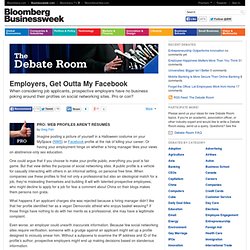
Or having your employment hinge on whether a hiring manager likes your views on abstinence-only sex education. One could argue that if you choose to make your profile public, everything you post is fair game. But that view defies the purpose of social networking sites. What happens if an applicant charges she was rejected because a hiring manager didn’t like that her profile identified her as a vegan Democratic atheist who enjoys basket weaving? Even worse, an employer could unearth inaccurate information. Also, let’s remember that people use the anonymity of the Internet to portray themselves as they want to be seen rather than as they really are. Job seekers already have to contend with background screens, drug tests, credit checks, and verification of employment history, education, and income.
Safe social networking. While most people who use social networking sites are well intentioned, you need to be careful about the information that you share and how you protect it.
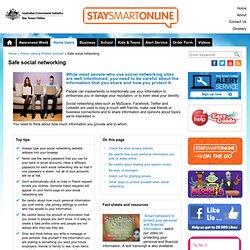
People can inadvertently or intentionally use your information to embarrass you or damage your reputation, or to even steal your identity. Social networking sites such as MySpace, Facebook, Twitter and Linkedin are used to stay in touch with friends, make new friends or business connections and to share information and opinions about topics we're interested in. You need to think about how much information you provide and to whom. Top tips Always type your social networking website address into your browser.Never use the same password that you use for your bank or email accounts. Read the website Privacy policy before you sign up. Some sites may share information such as email addresses or user preferences with businesses, which could send you spam. Once information is online, it is not easy to remove it completely. Use Facebook for Recruiting. Www.acas.org.uk/media/pdf/d/6/1111_Workplaces_and_Social_Networking.pdf.
UK tribunal upholds Apple's firing of retail employee for critical Facebook post. By Josh Ong A British Employment Tribunal has upheld Apple's decision to dismiss a retail store employee who violated company policy by posting derogatory comments about his employer on the Facebook social networking site.
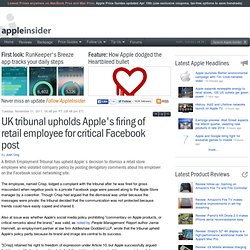
The employee, named Crisp, lodged a complaint with the tribunal after he was fired for gross misconduct when negative posts to a private Facebook page were passed along to the Apple Store manager by a coworker. Though Crisp had argued that the dismissal was unfair because the messages were private, the tribunal decided that the communication was not protected because friends could have easily copied and shared it. Also at issue was whether Apple's social media policy prohibiting "commentary on Apple products, or critical remarks about the brand," was valid, as noted by People Management.
IfoAppleStore noted that Apple does allow employees to post on the Internet, but forbids employees from mentioning the company's name or their employment at Apple. How your Facebook status could put you out of work. Employers often have a social media policy in your contract, strengthening their position in a tribunal.
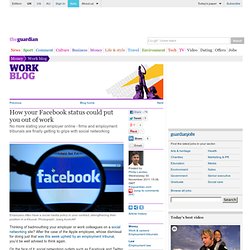
Photograph: Joerg Koch/AP Thinking of badmouthing your employer or work colleagues on a social networking site? After the case of the Apple employee, whose dismissal for doing just that was this week upheld by an employment tribunal, you'd be well advised to think again. On the face of it, social networking outlets such as Facebook and Twitter might appear to offer people an arena for venting their spleen on any issues, including gripes and grievances about work.
But although they may well be your own private views, such forums are often viewable by anyone, and you may face repercussions from your employer if you choose to write about work issues, regardless of whether it's from your desk, home or mobile phone. Many companies now have a social media/blogging policy as part of their contractual terms with employees, providing clear limitations about the permissible contents of a blog. How Companies Use Facebook To Hire And Fire Employees (INFOGRAPHIC) In an increasingly digitized world, roughly 45 percent of employers now reportedly use social media sites like Facebook, LinkedIn, and Twitter to screen potential employees, according to Mindflash.com.
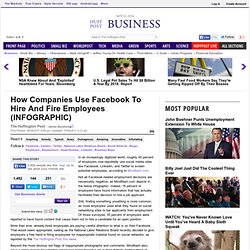
Not all Facebook-related employment decisions are necessarily negative, as Mindflash.com depicts in the below infographic. Indeed, 18 percent of employers have found information that has actually facilitated their decision to hire a job applicant. Still, finding something unsettling is more common, as more employers used what they found on social networking sites to bar applicants from employment. Of those surveyed, 35 percent of employers were reported to have found content that cause them not to hire a candidate for an open position. More than ever, already-hired employees are paying careful attention to what is on their Facebook. View mindflash.com infographic here: Social Screening: How Companies Are Using Social Media To Hire & Fire Employees.
Half of employers 'reject potential worker after look at Facebook page' How Recruiters Use Social Networks to Screen Candidates [INFOGRAPHIC] Over the past few years, we've seen social media used in the job market in a number of ways — startups, small businesses and large corporations alike are diving into the socialverse to find top talent, and job seekers are likewise getting creative with social media.
![How Recruiters Use Social Networks to Screen Candidates [INFOGRAPHIC]](http://cdn.pearltrees.com/s/pic/th/recruiters-infographic-17693305)
Social media monitoring service Reppler recently surveyed more than 300 hiring professionals to determine when and how job recruiters are screening job candidates on different social networks. The study found that more than 90% of recruiters and hiring managers have visited a potential candidate's profile on a social network as part of the screening process. And a whopping 69% of recruiters have rejected a candidate based on content found on his or her social networking profiles — an almost equal proportion of recruiters (68%), though, have hired a candidate based on his or her presence on those networks. Every week we post a list of social media and web job opportunities. Infographic courtesy of Reppler.